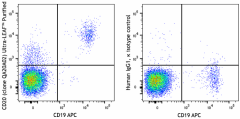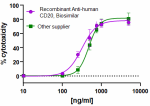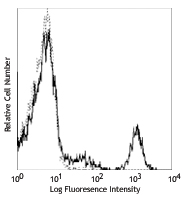- Clone
- QA20A02 (See other available formats)
- Regulatory Status
- RUO
- Other Names
- B-lymphocyte antigen CD20, B-lymphocyte surface antigen B1, Bp35, MS4A1, Leukocyte surface antigen Leu-16, membrane-spanning 4-domains superfamily A member 1
- Isotype
- Human IgG1, κ
- Ave. Rating
- Submit a Review
- Product Citations
- publications

-

Human peripheral blood lymphocytes were stained with Ultra-LEAF™ purified anti-human CD20 (Rituximab Biosimilar) recombinant (clone QA20A02) (left) or Ultra-LEAF™ purified human IgG1 isotype control (right), followed by PE anti-human IgG Fc recombinant. Cells were costained with anti-human CD19. -

Anti-human CD20 (Rituximab Biosimilar) Recombinant binds to human CD20 on the surface of Daudi cells activating complement- dependent cytotoxicity (CDC). Anti-human CD20 (Rituximab Biosimilar) Recombinant (purple) (clone QA20A02) activates CDC in a dose-dependent manner, similarly to another Rituximab Biosimilar from another supplier (green). This antibody has an IC50 range of 500-200 ng/mL. -

N-glycan profile from two different lots (Lot A and Lot B) of anti-human CD20 (rituximab biosimilar, RUO) recombinant, clone QA20A02. Chromatograms of glycosylation show lot-to-lot consistency. G0= N-glycan without galactosylation, G0F=Fucosylated without galactosylation, G1Fa and G1Fb= N-glycan with one terminal galactosylation and fucosylation, G2F= N-glycan fucosylated with both terminal galactosylation, Man5= N-linked mannose-5 glycan -

| Cat # | Size | Price | Quantity Check Availability | Save | ||
|---|---|---|---|---|---|---|
| 378003 | 100 µg | 216€ | ||||
| 378004 | 1 mg | 595€ | ||||
CD20 is a surface marker expressed on B lymphocytes. CD20 is a 33-37 kD protein with four hydrophobic transmembrane domains that it associates with cell-surface and cytoplasmic proteins such as CD53, CD81, CD82, MHCII, CD40, CBP, and BCR. This association contributes to signal transduction essential for the development, differentiation, and activation of B cells. CD20 is also variably expressed by B cell malignancies such as Chronic lymphocytic leukemia (CLL), follicular lymphoma, and diffuse large B-cell lymphoma (DLBCL).
Product DetailsProduct Details
- Verified Reactivity
- Human
- Antibody Type
- Recombinant
- Host Species
- Human
- Immunogen
- Human CD20
- Formulation
- 150 mM sodium chloride, pH 6.5
- Preparation
- The Ultra-LEAF™ (Low Endotoxin, Azide-Free) antibody was purified by affinity chromatography.
- Concentration
- The antibody is bottled at the concentration indicated on the vial, typically between 2 mg/mL and 3 mg/mL. Older lots may have also been bottled at 1 mg/mL. To obtain lot-specific concentration, please enter the lot number in our Concentration and Expiration Lookup or Certificate of Analysis online tools.
- Storage & Handling
- The antibody solution should be stored undiluted between 2°C and 8°C. This Ultra-LEAF™ solution contains no preservative; handle under aseptic conditions.
- Application
-
FC - Quality tested
CMCD - Verified - Recommended Usage
-
Each lot of this antibody is quality control tested by immunofluorescent staining with flow cytometric analysis. For flow cytometric staining, the suggested use of this reagent is ≤ 0.25 µg per million cells in 100 µL volume. For Complement-Dependent Cytotoxicity assays the IC50 range is 0.2 - 0.5 µg/mL. It is recommended that the reagent is titrated for optimal performance for each application.
- Application Notes
-
This recombinant antibody is based on the published sequence for the Rituximab antibody. This product is for research use only. It is not intended for therapeutic or diagnostic purposes.
- RRID
-
AB_2924569 (BioLegend Cat. No. 378003)
AB_2924569 (BioLegend Cat. No. 378004)
Antigen Details
- Structure
- CD20 protein has four membrane-spanning domains with both the amino and carboxy termini facing the cytosol
- Distribution
-
B cell, T cell subset
- Function
- The function of CD20 involves the development, differentiation, and activation of B cells
- Interaction
- CD20 associates with CD53, CD81, CD82, MHCII, CD40, CBP, BCR, and Src family kinases
- Ligand/Receptor
- The ligand for CD20 is unknown
- Molecular Family
- CD Molecules
- Antigen References
-
- Li H, et al. 2003. J Biol Chem. 278:42427-34.
- Pavlasova G, et al. 2020. Haematol. 105:1494-1506.
- Kuek E, et al. 2016. Immunol Cell Biol. 94:11-23.
- Gene ID
- 931 View all products for this Gene ID
- UniProt
- View information about CD20 on UniProt.org
Related Pages & Pathways
Pages
Related FAQs
- Do you guarantee that your antibodies are totally pathogen free?
-
BioLegend does not test for pathogens in-house aside from the GoInVivo™ product line. However, upon request, this can be tested on a custom basis with an outside, independent laboratory.
- Does BioLegend test each Ultra-LEAF™ antibody by functional assay?
-
No, BioLegend does not test Ultra-LEAF™ antibodies by functional assays unless otherwise indicated. Due to the possible complexities and variations of uses of biofunctional antibodies in different assays and because of the large product portfolio, BioLegend does not currently perform functional assays as a routine QC for the antibodies. However, we do provide references in which the antibodies were used for functional assays and we do perform QC to verify the specificity and quality of the antibody based on our strict specification criteria.
- Does BioLegend test each Ultra-LEAF™ antibody for potential pathogens?
-
No, BioLegend does not test for pathogens in-house unless otherwise indicated. However, we can recommend an outside vendor to perform this testing as needed.
- Have you tested this Ultra-LEAF™ antibody for in vivo or in vitro applications?
-
We don't test our antibodies for in vivo or in vitro applications unless otherwise indicated. Depending on the product, the TDS may describe literature supporting usage of a particular product for bioassay. It may be best to further consult the literature to find clone specific information.
Other Formats
View All CD20 Reagents Request Custom Conjugation| Description | Clone | Applications |
|---|---|---|
| Ultra-LEAF™ Purified anti-human CD20 (Rituximab Biosimilar, RUO) Recombinant Antibody | QA20A02 | FC,CMCD |
Customers Also Purchased
Compare Data Across All Formats
This data display is provided for general comparisons between formats.
Your actual data may vary due to variations in samples, target cells, instruments and their settings, staining conditions, and other factors.
If you need assistance with selecting the best format contact our expert technical support team.
-
Ultra-LEAF™ Purified anti-human CD20 (Rituximab Biosimilar, RUO) Recombinant Antibody

Human peripheral blood lymphocytes were stained with Ultra-L... 
Anti-human CD20 (Rituximab Biosimilar) Recombinant binds to ... 
N-glycan profile from two different lots (Lot A and Lot B) o... 

 Login / Register
Login / Register 













Follow Us